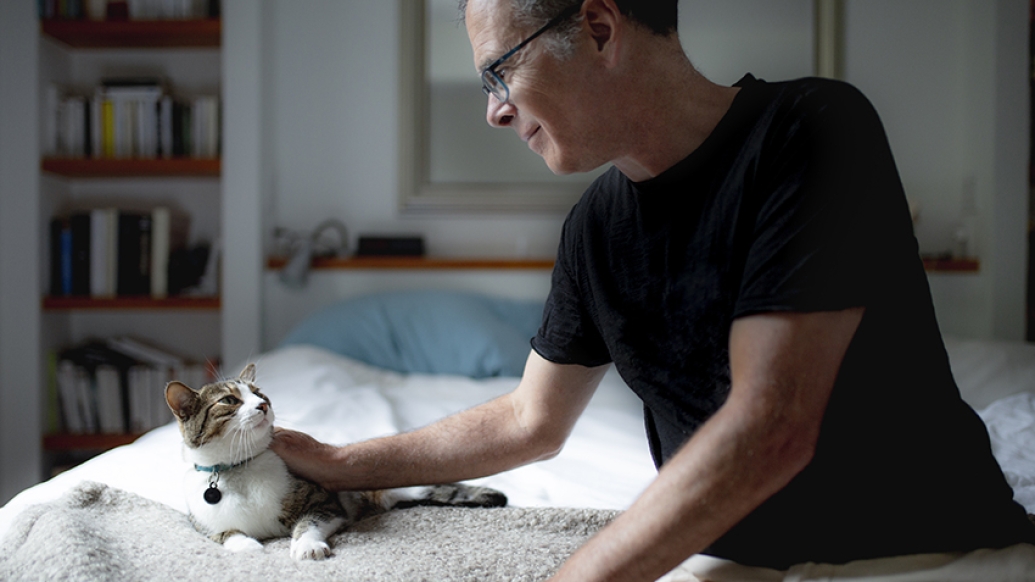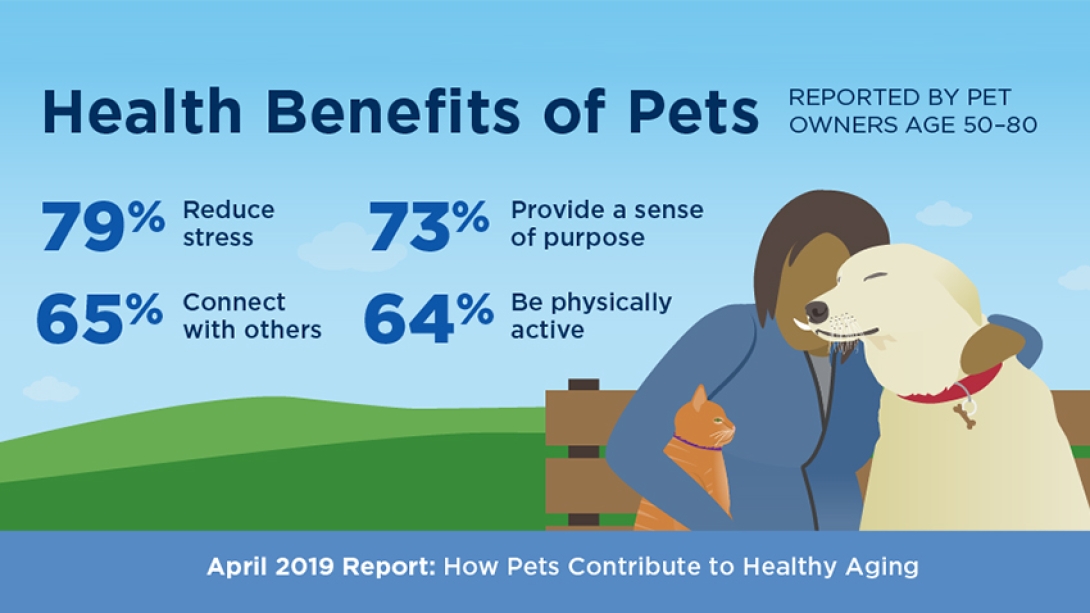Two-thirds of all pet owners say that having an animal helps them stay physically active. But for some older adults, time commitment, cost and allergies stand in the way.
6:01 AM
Author |

A curled-up cat, a tail-wagging dog, a chirping parakeet or even a serene goldfish may help older adults cope with mental and physical health issues, according to a new national poll.
But while pets come with benefits, they can also bring concerns, and some people may even put their animals' needs ahead of their own health, the poll finds.
LISTEN UP: Add the new Michigan Medicine News Break to your Alexa-enabled device, or subscribe to our daily audio updates on iTunes, Google Play and Stitcher.
In all, 55 percent of adults ages 50 to 80 have a pet, according to the new findings — and more than half of those have multiple pets. More than three-quarters of pet owners say their animals reduce their stress, and nearly as many say pets give them a sense of purpose. But 18 percent also said having a pet or pets puts a strain on their budget.
Relationships with pets tend to be less complicated than those with humans, and pets are often a source of great enjoyment. They also provide older adults with a sense of being needed and loved.Mary Janevic, Ph.D., MPH
Two-thirds of all pet owners, and 78 percent of dog owners, said their pet helps them be physically active, according to the new findings from the National Poll on Healthy Aging.
The poll is conducted by the University of Michigan Institute for Healthcare Policy & Innovation, and sponsored by AARP and Michigan Medicine, U-M's academic medical center.
For those who reported that their health was fair or poor, pet ownership appeared to offer even more benefits. More than 70 percent of these older adults said their pet helps them cope with physical or emotional symptoms, and 46 percent said their pets help take their mind off of pain.
"We have long known that pets are a common and naturally occurring source of support," says Cathleen Connell, Ph.D., a professor at the U-M School of Public Health who has studied the role of companion animals in older adults' lives.
MORE FROM MICHIGAN: Sign up for our weekly newsletter
"Although the benefits of pets are significant, social connections and activities with friends and family are also key to quality of life across the life span," she says. "Helping older adults find low-cost ways to support pet ownership while not sacrificing other important relationships and priorities is an investment in overall mental and physical health."
Poll director Preeti Malani, M.D., a U-M Medical School professor who has training in caring for older adults, says the poll results indicate a need for physicians and other health care providers to ask older adults about the role of pets in their lives.
"More activity, through dog walking or other aspects of pet care, is almost always a good thing for older adults," Malani says. "But the risk of falls is real for many, and 6 percent of those in our poll said they had fallen or injured themselves due to a pet."
"At the same time, given the importance of pets to many people, the loss of a pet can deal a very real psychological blow that providers, family and friends should be attuned to," she says.

"This study highlights the many physical, psychological and social benefits that pets can have for older adults," says Alison Bryant, Ph.D., senior vice president of research for AARP. "In recognition of these health benefits, more assisted living facilities today are allowing residents to have pets."
Pet positives
Companionship and social connection were positive side effects of pet ownership for many poll respondents.
In fact, more than half of those who owned pets said they did so specifically to have a companion — and a slightly higher percentage said their pets sleep in bed with them. Sixty-five percent of pet owners said having a pet helps connect them to other people, too.
"Relationships with pets tend to be less complicated than those with humans, and pets are often a source of great enjoyment," says Mary Janevic, Ph.D., MPH, an assistant research scientist at the U-M School of Public Health who helped design the poll. "They also provide older adults with a sense of being needed and loved."
Pet problems
Other concerns about pet ownership emerged in the poll results. More than half of pet owners said that having a pet also made it difficult to travel or enjoy activities outside the home.
And 1 in 6 said that they put their pet's needs ahead of their own health needs — a figure that was closer to 1 in 4 among those with health issues.
SEE MORE: The Healing Power of Hospital Dogs
"Later life is often a time when people have more freedom to travel, and a long list of things they want to do with their free time, and sometimes having a pet can get in the way," says Janevic.
"For people living on a fixed income, expenses related to health care for pets, and especially pets that have chronic health issues, can be a struggle," she says. "Older adults can also develop health problems or disabilities that make pet care difficult."
The non-pet-owner perspective
The 45 percent of older adults who said they don't have pets gave many reasons for not keeping a dog, cat, fish, lizard, bird or small mammal around.
Among non-pet owners, 42 percent said they didn't want to be tied down. Twenty percent said they didn't have time, and 23 percent gave cost as the reason, while 16 percent said their own allergies, or those of someone in their household, kept them from getting a pet.
For those who can't own pets due to allergies, budget constraints, housing circumstances or schedules, there's often a need for volunteers at local animal shelters or pet-sitting for friends and family, the researchers say.
They note that health care providers and family may even want to recommend these options to older adults who have no pets and wish to have one.
The National Poll on Healthy Aging results are based on responses from a nationally representative sample of 2,051 adults ages 50 to 80 who answered a wide range of questions online. Questions were written, and data interpreted and compiled, by the IHPI team. Laptops and internet access were provided to poll respondents who did not already have them.
A full report of the findings and methodology is available at healthyagingpoll.org, along with past National Poll on Healthy Aging reports.

Explore a variety of health care news & stories by visiting the Health Lab home page for more articles.

Department of Communication at Michigan Medicine
Want top health & research news weekly? Sign up for Health Lab’s newsletters today!





